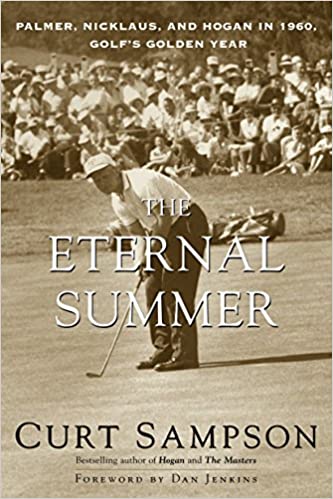On a hot July day in 1970, my date and I paused for a while in the sun dappled shade by the eighteenth tee to watch a few groups launch their final tee balls in the first round of the American Golf Classic at Firestone CC. Miss Thomas and I were eighteen.
One group hit, the next group arrived, and into the small green stage pranced a man in head-to-toe robin’s egg blue. The sun caught the pomade in his dark hair; Doug Sanders would never wear a hat, which might impede someone’s view of Doug Sanders. He preened for a few moments while scanning the crowd as if examining a menu. Finding what he wanted, he sauntered over to us.
Bold as brass, Dougie reached across the ropes and removed my girl’s yellow sunglasses. He put them on. “We all live in a yellow submarine,” he sang, and sashayed around. Some of us laughed to see such sport but not me. Mr. Sanders was hitting on my girlfriend.
The world turned quite a few times before the colorful and very popular Sanders and I properly met, when I was researching a book about golf’s major championships in 1960, a watershed year in golf. I interviewed everyone from Arnie to Hogan to Jack for The Eternal Summer, but no one spoke more fulsomely than the flashy man from Cedartown, Georgia.
“He speaks in a sort of sing-song and is apt to hold your arm and put his face very close to yours when he reminisces,” I wrote. “He doesn’t want you to miss a word.”
I recall the faraway look in his eyes when he recalled the time he “was having dinner with Mr. Frank Sinatra, and we were drinking a ’59 Chateau Lafite, and Frank said, ‘George’—that’s my real first name, my close friends call me George—‘you, W.C. Fields, Errol Flynn and me—there are only a few of us who can say—I Did It My Way.’”
He played golf his way, too, with a swing so short and snappy that it was nearly invisible—but man, did it ever work: 20 PGA tour wins and second place finishes in four majors. For all his pomp, Sanders competed as hard and as well as anyone.
“No one could play like Sanders—and his golf game was good, too,” I concluded cheekily in The Eternal Summer. “He was the heir to Walter Hagen as the hardest partier and most successful ladies’ man in sport.”

I would come to know him well. Doug bugged me (and one or two others) with ongoing entreaties to ghostwrite his autobiography. But I didn’t want to write about what he wanted to talk about, which was sex as often as it was golf.
Sanders struck me as a sad man during his later years in the game.
As the winner of the 1961 Colonial, he asserted his right to attend the Wednesday night Champions Dinner and then took to hanging around for a few days afterwards. He had real skill at “putting” with the side of the mint green or orange or purple patent leather shoe adorning his right foot. He wanted spectators to notice his accurate kicks from ten feet and he hoped to engage with the competitors on the crowded practice green, but neither happened the times I watched this spectacle.
On the other hand:
“Not many people can say what I’m about to say,” he told me back in ’92. “If I died today and could come back as anyone else, I’d come back as me.”
George Douglas Sanders died over the weekend. He was 86.
To read more of Curt’s reporting on Sanders, read The Eternal Summer: Palmer, Nicklaus, and Hogan in 1960, Golf’s Golden Year.


Recent Comments